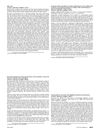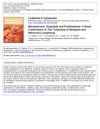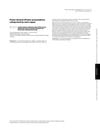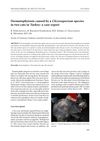 March 2023 in “Zdorov'â čolovìka”
March 2023 in “Zdorov'â čolovìka” Certain medications can reduce sexual desire and function, especially in women.
 December 2013 in “Macedonian Journal of Medical Sciences”
December 2013 in “Macedonian Journal of Medical Sciences” Ovarian steroid cell tumors should be considered in adults with hirsutism and high testosterone, with surgery as the main treatment.
 March 2012 in “Journal of The American Academy of Dermatology”
March 2012 in “Journal of The American Academy of Dermatology” Hand-foot-mouth disease may cause nail loss in children.
May 1979 in “Archives of Dermatology” Alopecia can be linked to autoimmune issues, vitiligo, nail problems, and sometimes cancer treatments.
1 citations,
April 2023 in “Heliyon” Disitamab vedotin and gemcitabine effectively treated bladder cancer without major side effects.
 2 citations,
January 1990 in “Leukemia & Lymphoma”
2 citations,
January 1990 in “Leukemia & Lymphoma” The combination of mitoxantrone, etoposide, and prednisolone is effective for treating relapsed lymphoma with manageable side effects.
Alkylating agents can kill cancer cells but may cause skin and allergic reactions.
 88 citations,
July 2014 in “Journal of the American Academy of Dermatology”
88 citations,
July 2014 in “Journal of the American Academy of Dermatology” Targeted cancer therapies often cause skin reactions, so dermatologists must manage these effects.
 5 citations,
June 2001 in “Annals of Internal Medicine”
5 citations,
June 2001 in “Annals of Internal Medicine” Rituximab effectively treated a woman's bone lymphoma that was resistant to other treatments.
 1 citations,
October 2014 in “Annals of oncology”
1 citations,
October 2014 in “Annals of oncology” Paclitaxel and nab-paclitaxel can be safe and effective for advanced gastric cancer patients on hemodialysis.
 126 citations,
January 2001 in “World Journal of Surgery”
126 citations,
January 2001 in “World Journal of Surgery” Surgery is the main treatment for liver hydatidosis, but has risks; albendazole is the most effective drug but can have side effects.
 82 citations,
December 2015 in “Nanomedicine”
82 citations,
December 2015 in “Nanomedicine” Nanoparticle systems make cancer treatment less toxic.
54 citations,
September 2012 in “Acta ophthalmologica” Cancer treatments can cause various eye problems, so eye doctors should know how to diagnose and treat these early.
 50 citations,
February 2018 in “Biomedicine & pharmacotherapy”
50 citations,
February 2018 in “Biomedicine & pharmacotherapy” Ginseng may help treat cancer and reduce treatment side effects, but more research is needed.
 43 citations,
February 2020 in “Clinica chimica acta”
43 citations,
February 2020 in “Clinica chimica acta” Nano-sized plant-based chemicals could improve cervical cancer treatment by being more effective and causing fewer side effects than current methods.
 35 citations,
May 2008 in “Journal of Clinical Oncology”
35 citations,
May 2008 in “Journal of Clinical Oncology” A cancer patient died from a severe skin reaction after taking the drug cetuximab.
 35 citations,
January 2004 in “European journal of oncology nursing”
35 citations,
January 2004 in “European journal of oncology nursing” Capecitabine is as effective as intravenous treatments with fewer side effects, but requires careful management of Hand-foot syndrome and patient education.
27 citations,
April 2021 in “Phytotherapy Research” Curcumin may be an effective and safer anticancer agent by regulating key cell pathways.
21 citations,
August 1987 in “Archives of Dermatology” High-dose methotrexate can cause severe skin and nail issues.
19 citations,
June 2022 in “Molecular therapy. Nucleic acids” A specific RNA, circNlgn, contributes to heart damage and scarring caused by the cancer drug doxorubicin.
 18 citations,
January 2019 in “Experimental Dermatology”
18 citations,
January 2019 in “Experimental Dermatology” Certain cells outside the hair follicle's bulge area can quickly regenerate damaged hair follicles, potentially helping to reduce hair loss from cancer treatments.
 17 citations,
January 2015 in “MedChemComm”
17 citations,
January 2015 in “MedChemComm” New treatments for prostate cancer are less toxic and show promise, but more research is needed to enhance their effectiveness and reduce side effects.
 17 citations,
January 2010 in “International journal of trichology”
17 citations,
January 2010 in “International journal of trichology” A man experienced hair loss from radiotherapy, which can be temporary or permanent depending on radiation dose, with potential treatments available.
12 citations,
February 2022 in “Frontiers in Pharmacology” Asparagus racemosus and Withania somnifera can help reduce side effects of a cancer drug.
10 citations,
April 2014 in “Molecular and Clinical Oncology” Alopecia areata can be an early sign of Hodgkin’s lymphoma and may improve with lymphoma treatment.
 8 citations,
July 1996 in “Annals of Internal Medicine”
8 citations,
July 1996 in “Annals of Internal Medicine” Itraconazole may cause low platelet and white blood cell counts.
 7 citations,
October 2019 in “Annals of palliative medicine”
7 citations,
October 2019 in “Annals of palliative medicine” New targeted cancer drugs can cause skin side effects, and managing them requires patient education and timely care.
 4 citations,
January 2018 in “Cancer treatment and research”
4 citations,
January 2018 in “Cancer treatment and research” The document concludes that systemic therapy is becoming more important in treating head and neck cancer, with new treatments showing promise.
 4 citations,
December 2013 in “Veterinární medicína”
4 citations,
December 2013 in “Veterinární medicína” Two cats and their owner in Turkey were successfully treated for a rare fungal infection with fluconazole.
2 citations,
March 2020 in “JAAD case reports” A leukemia patient showed skin peeling similar to kwashiorkor, a severe protein deficiency.




















